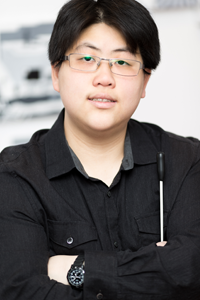Don't see what you're looking for?
Main Site
Berklee.eduCampuses and Schools

Matthew Wan
Tiffany Chang
For media inquiries, please contact Media Relations
- Founder and conductor of the New England Repertory Orchestra
- Conductor of Arts and Sciences Orchestra at Oberlin Conservatory of Music
- Residency at the Dallas Opera 2019 Hart Institute for Women Conductors
- Music director and conductor for North End Music and Performing Arts Center's Opera Project
- Acting director of orchestral activities, Boston University School of Music
- Interim director of orchestral studies and assistant professor at Baldwin Wallace Conservatory of Music
- Winner, Solti Foundation U.S. Career Assistance Award, 2020
- Winner, the American Prize in Conducting (community opera), 2017
- Third prize, The American Prize in Conducting (college/university orchestra), 2014
- Third prize, The American Prize in Orchestral Performance (college/university), 2014
- Recipient of Esther B. and Albert S. Kahn Career Entry Award
- Recipient of Ernest Hatch Wilkins Memorial Prize
- D.M.A., Boston University
- M.M.E., Oberlin Conservatory of Music
- B.M., Oberlin Conservatory of Music
"In Conducting 1 and 2, one of my goals is to expose students to this facet of a well-rounded music education. We focus not only on the technical aspects of conducting but also on other aspects of musicianship, like how to decipher a score and how to work with a soloist. This contributes to the overall literacy and leadership skills of my students whether they are jazz, contemporary, or classical musicians."
"Twice a semester I ask my students to observe a live rehearsal of any type of ensemble with a conductor. When they come back to class, they’re full of questions. They’ll ask, for example, 'We talked about doing it this way in class, why did the conductor do it that way?' It’s important for them to be able to critically evaluate themselves and others, so I also play videos of different conductors conducting the same piece and ask them to critique them as they would critique each other."
"I’ve been fortunate to have had many passionate music teachers in high school and college who inspired me to be involved in teaching music in some way. I began my undergraduate studies in music education and cello performance, then I got hooked on conducting after working with ensembles from my student teaching in the public schools and my work with collegiate, community, and professional orchestras."
"Curiosity about every aspect of music really helped me become a more thoughtful conductor, educator, and musician. So being exposed to as many professional and artistic skills as possible is something I work hard to communicate to my students. I encourage them to be open-minded about their activities as musicians and students, and I tell them not to be afraid to experiment with a project they’re not yet comfortable with. Every skill and concept in music is connected. When you absorb ideas like a sponge, that’s what makes that large web clearer and clearer. I want my students to leave my class feeling that they have become more well-rounded, better educated, more curious, and more interesting musicians."
Get More Information
By requesting information from Berklee, you will receive emails about our educational programs, student resources, facilities, and more based on your selections.
Thank you for requesting information.
Check your inbox for an email from Berklee. You will start to receive program information, updates, and deadline reminders.
Find the program that's right for you with Berklee's Find Your Program tool.
